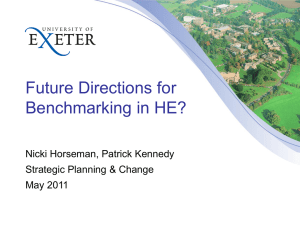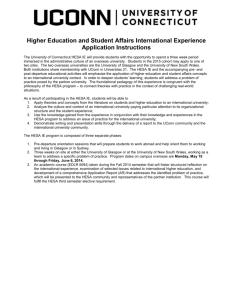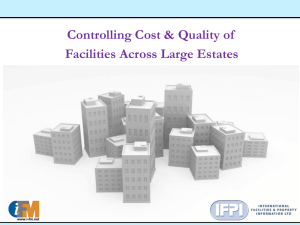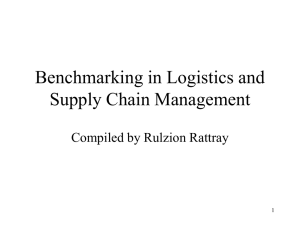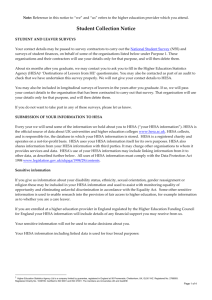Course costing…
advertisement
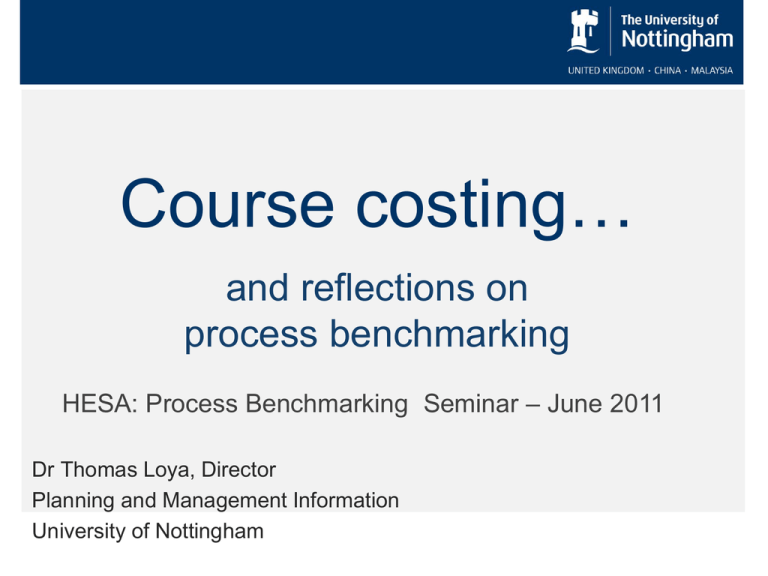
Course costing… and reflections on process benchmarking HESA: Process Benchmarking Seminar – June 2011 Dr Thomas Loya, Director Planning and Management Information University of Nottingham Introduction Overview Process benchmarking: evaluating aspects of processes in relation to peer group / sector ‘best practice’ – but how best to determine? 1.Various models for identifying good practice 2.Course costing: University of Nottingham’s journey 2 HESA: Process Benchmarking Seminar – June 2011 Process BM: Other models Independent HE Research Agencies (USA) • • • • • • Extensive specialist research capability Membership based - but wide representation Expanding membership into UK Strong basis for Identifying good practice Comprehensive coverage of HE activities Examples: – Education Advisory Board – Hanover Research Council HESA: Process Benchmarking Seminar – June 2011 3 Process BM: Other models Standards organisations (BSI, ISO, etc) • • • • • Justifiable claim to define best practice Extensive cross-sector engagement Strong links to international / global practice Negligible engagement by UK HE sector! Strong coverage of biz process improvement: Risk mgmt, Info security, environmental mgmt, business continuity, accessibility, business system documentation, supply chain mgmt, etc HESA: Process Benchmarking Seminar – June 2011 4 Course costing Purposes and issues • • • • • • Assess teaching cost, income & profitability Focus resource on higher net revenue areas Cultural change: cost & efficiency awareness Identify all costs - in Schools and ‘centre’ Provide powerful form of mgmt information Not to be used in isolation; context is a review / refresh of institutional portfolio HESA: Process Benchmarking Seminar – June 2011 5 Course costing Two overall approaches • Bottom-up: activity based costing – – – – Aggregate up specific activity costs Detailed time, quantity, activity data Fine grained; costly to gather & analyse data Successful one-School pilot => scalability issues • Top-down – Parcel out high-level costs to modules – Aggregate up costs to courses – Broad-brush, use centrally held data – Set out on this path for first institution-wide exercise HESA: Process Benchmarking Seminar – June 2011 6 Course costing The Model: Costs TRAC Teaching Costs By School Teaching Assessment Fixed Costs HESA: Process Benchmarking Seminar – June 2011 Other Variable Costs 7 Course costing The Model: Shares Module Fixed Cost Amount Credits * School share * weight HESA: Process Benchmarking Seminar – June 2011 Module Variable Cost Amount Credits * School share * weight * students 8 Course costing The Model: Modules Module Variable Cost Amount Module Fixed Cost Amount Fixed Costs Module Income Total Module Income and Costs HESA: Process Benchmarking Seminar – June 2011 Variable Costs Central Costs 9 Course costing The Model: Courses Module Income and Costs Students by Course and Module HESA: Process Benchmarking Seminar – June 2011 Course Income and Costs 10 Course costing Outputs • Income, school and central costs => operating and net margins, for every course • Currently covers UG + PGT, for 2 years • Identify cost drivers, areas for review • Valuable input to academic strategy development and institutional portfolio review HESA: Process Benchmarking Seminar – June 2011 11 Course costing Some issues and next steps • • • • • Costs dependent on module classification Skepticism about use of TRAC data Input data as valuable as headline figures Complex chain of reasoning to mgmt action Have moved to bottom-up approach! HESA: Process Benchmarking Seminar – June 2011 12 Course costing Practical considerations • High data volumes led to use of Cognos EP for data management and analysis • Long period to register impact of changes • To gain full value, needs to be repeatable • Bottom-up data gathering is costly • Can appear contrary to academic culture HESA: Process Benchmarking Seminar – June 2011 13 Course costing Implications for benchmarking… • Feasibility dependencies: data availability, data mgmt capability, drivers, scale, scope… • Costs may reflect mission, subject mix, organisation structure, efficiency of ops • Powerful internal metric, but… – Not likely to be a quick win – Difficult/impossible to include quality – Limited scope comparability b/w HEIs HESA: Process Benchmarking seminar – June 2011 14 Finally… Issues, questions and concerns • • • • • • Best practice vs just ‘good’ practice(s)? Efficiency - institution or sector attribute? Competition - cuts both ways Can be irrational to share real innovation Myth of ‘HE exceptionalism’ What do we want from HESA? HESA: Process Benchmarking Seminar– June 2011 15 Thank you For questions, please contact: Thomas.loya@nottingham.ac.uk
